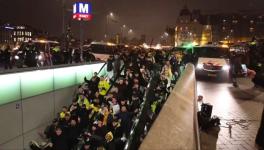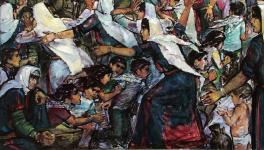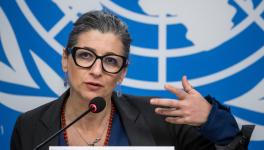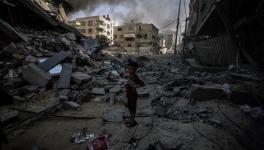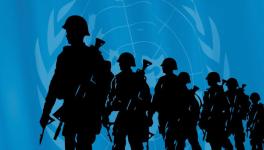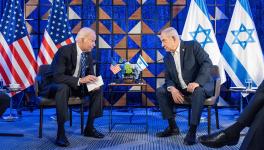Israeli Cruelty and Palestine’s Predicament
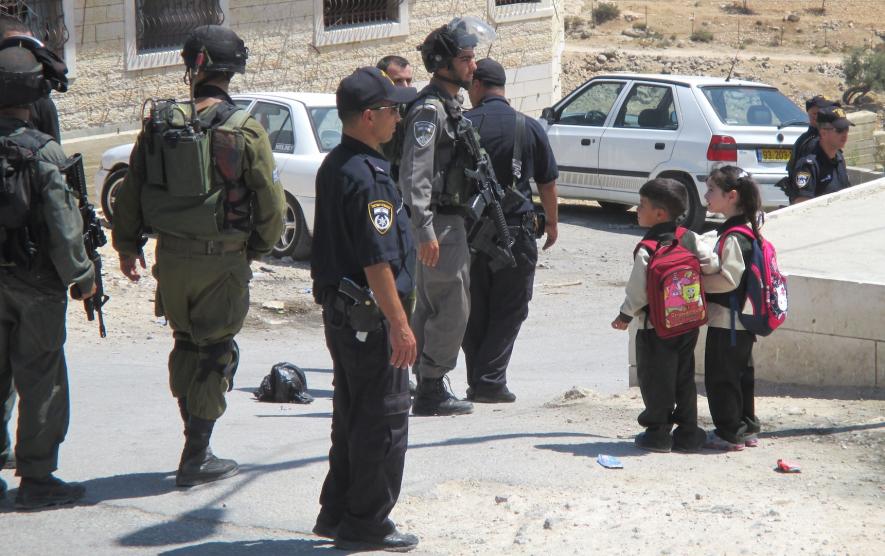
Standing on the campus of Birzeit University in Ramallah (Palestine) one gets a full flavour of the beauty of Palestine as well as of its electric tension. Dryness in the hills is broken by patches of flowers. Watching me look over at the flowers, a young student approaches me and asks what I am looking at. I point to a verge of flowers – red mainly, but also purple and blue. The student says, those are shaqa’iq an-naa’manor anemones. They are dazzling. The student tells me about the tensions at the university. There are always tensions at the university. A few days before, the Israeli police had tried to enter the campus to arrest some student leaders. It is a normal situation. A warm day, beautiful flowers and the threat of violence from the Israeli authorities.
**
Birzeit opened in 1924, when Palestine was Palestine, as a school of girls, adding in boys two years later. Hanna Nasir, whose father and aunt founded the school, took it further after the Israeli occupation of the West Bank and made it a university in 1972. The Israeli state told Hanna Nasir that this act was ‘illegal’. There is not one piece of evidence to show that the Israelis – from 1948 to now – have been keen on the education of the Palestinian people. Birzeit University, the most prestigious of the Palestinian schools and of its institutions, has been under military threat from then till now.
But, as the Palestinian intellectual Edward Said wrote in 1998, ‘The sheer survival of Birzeit is of course one of the many stories of Palestinian resistance against outright Israeli oppression’. Said could have said cruelty. One more example of this cruelty is now in evidence. For the past eight years – since 2010 – Israel has refused to turn over postal mail to the Palestinian Postal Service. Now, boxes of mail have arrived in Jerico, where postal workers find not only letters but also a wheelchair.
Murder by Israeli snipers at the Gaza perimeter fence, bulldozing of entire villages in the West Bank, seizure of key parts of East Jerusalem, racist statements by Israeli politicians, a law that says that Israel is a Jewish state (and that is Muslim, Christian and atheist citizens are now secondary), denial of education and mail service – this is the list of cruelty.
**
In 2005, Palestinian activists called upon allies outside Palestine to join a Boycott-Divestment-Sanctions (BDS) movement. The goal of the BDS struggle was to put pressure on an obdurate Israel and force the occupying power to negotiation with the Palestinians. Israel’s propaganda outfits aggressively said that BDS was anti-Semitic; any criticism of Israel or Zionism, they said, was tantamount to racism. But, more and more people joined the BDS struggle, finding it an adequate – and peaceful – way to put pressure on an increasingly right-wing and xenophobic Israeli ruling class. Musicians and intellectuals, sports teams and tourists all began to put their stamp on the BDS movement.
The popularity of this movement has led Israel and its international allies to take drastic moves. Israel passed an anti-Boycott law in 2011 and has used whatever means possible to block the entry into the country of BDS activists. It has also gone after anyone who has said anything critical of Israel, Zionism or Prime Minister Benjamin Netanyahu. Even liberal US journalists, such as Peter Beinart, have been harassed at Ben Gurion airport. No-one who has a word to say against Israeli policy is given a second chance.
It is, therefore, to be expected that Israel has now blocked the entry of half of the foreign nationals who teach at BirZeit and at other Palestinian institutions of higher learning (from Gaza’s University of Palestine to Jerico’s al-Istiqlal University). Amongst them is a history professor who has taught at BirZeit for thirty-five years – Roger Heacock – and the health specialist – Laura Wick. I met Roger and Laura several times in Lebanon over the years and found them to be warm and generous people, committed to the values of truth, justice and decency. They moved to Palestine in 1983, coming from Central America, where they had gone to provide their services to the Sandinista revolution. In 1987, Roger was convicted of ‘disturbing the peace’ for taking part in a demonstration. ‘This is a black day for jurisprudence’, said Roger, who had gone to town to get some juice, saw Palestinian women protesting and went to see what was written on their signs. He is, therefore, no stranger to Israeli cruelty. Now, Roger, Laura and the other foreign nationals who play a key role in Palestinian institutions have been prevented from re-entry.
These are the professors. Meanwhile, Israeli authorities continue to bulldoze Palestinian schools and try and prevent Palestinian children from getting to school through checkpoints. In the al-Tawani neighbourhood in Yatta (Palestine), the Israelis sent in an army of bulldozers to destroy the mobile classrooms. In Beit Ta’mar, south-east of Bethlehem, the Israeli forces came and destroyed the caravans that had been used as temporary schools. It is no surprise, therefore, that 40% of communities in the West Bank have no elementary schools. It is why children have to walk a distance to study, often to be stopped and harassed at Israeli checkpoints. This is a war against education, a war against Palestinian children, a war against memory and history.
The classes to be taught at Birzeit by the foreign nationals, meanwhile, await their teachers.
Get the latest reports & analysis with people's perspective on Protests, movements & deep analytical videos, discussions of the current affairs in your Telegram app. Subscribe to NewsClick's Telegram channel & get Real-Time updates on stories, as they get published on our website.










